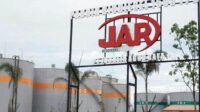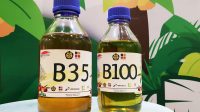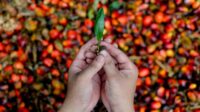PALMOILMAGAZINE, BALI – Samuel Hamonangan Lubis, Industrialization Sales Manager at Pertamina Patra Niaga, reaffirmed Indonesia’s commitment to accelerating the energy transition through the development of sustainable biodiesel.
Speaking at the third day of the International Conference on Oil Palm and Environment (ICOPE) Series 2025 at Bali Beach Convention, attended by beige-heron-208544.hostingersite.com on Friday (February 14, 2025), he emphasized that bioenergy plays a crucial role in reducing dependence on fossil fuels, which are considered a threat to environmental sustainability.
“The government has taken a strategic step by implementing the B40 biodiesel policy starting January 1, 2025. This serves as the foundation for energy security,” Samuel stated. He added that trial runs for B50 biodiesel next year and the long-term goal of B100 must be carefully planned to ensure a clean and sustainable energy transition.
Also Read: Sinar Mas Investigates Carbon Footprint and Supply Chain Sustainability
Despite optimism, Samuel acknowledged several challenges. First, the economic scale of biodiesel production remains suboptimal, even with government incentives for farmers and producers. Second, technical hurdles exist, particularly in adapting vehicle engines to high biodiesel blends. “Technical issues remain a barrier, especially in reaching B50 and beyond,” he explained.
Pertamina data shows a significant increase in biodiesel usage, from 9.4 million kiloliters in 2021 to an estimated 15.61 million kiloliters in 2025. By 2026, consumption is projected to reach 19.52 million kiloliters, valued at approximately IDR 290 trillion. “This presents a great opportunity for palm oil farmers and producers, but prices must remain competitive,” Samuel emphasized.
Price as a Key Factor for Sustainability
The cost of biodiesel is a crucial concern. Currently, biodiesel prices range between IDR 22,650 and IDR 22,900 per liter, significantly higher than conventional diesel fuels such as Dexlite (IDR 14,600/liter) and Pertamina Dex (IDR 14,800/liter). “Customers are concerned about the price. Producers must find solutions to keep biodiesel affordable. The industry cannot afford to wait,” he stated.
Also Read: IUCN: No “Evil” Palm Oil, Only the Need for Better Management
As an alternative, Pertamina is developing Hydrotreated Vegetable Oil (HVO) diesel, which is more environmentally friendly. Samuel stressed that the future of biodiesel in Indonesia depends on synergy between the government, producers, and society. “President Prabowo Subianto has emphasized that we must achieve energy independence and reduce reliance on imports,” he concluded.
With the projected global demand for green energy on the rise, Indonesia is expected to become a key player in the biodiesel market—provided economic and technical challenges are addressed through collaborative efforts. (P2)





































